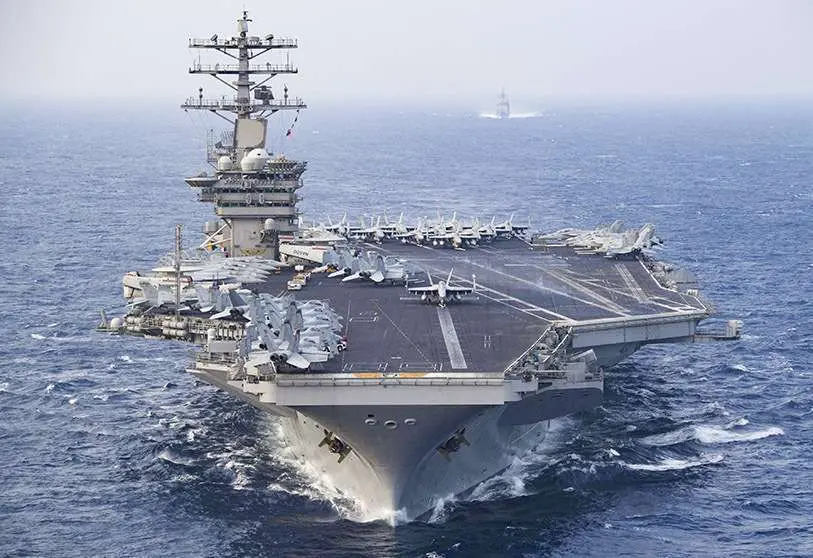US aircraft carrier in Gulf waters attracts international attention

The United States deployed the aircraft carrier USS Nimitz in the waters of the Gulf and its location in the Middle East region has set alarm bells ringing in view of the growing confrontation between the American giant and the Islamic Republic of Iran, which was heightened by the assassination a few hours ago of the Iranian nuclear scientist Mohsen Fajrizadeh, who was seen from the West as responsible for the former secret Persian programme to develop nuclear weapons.
The US aircraft carrier USS Nimitz was sent to the Gulf this week, days before the murder of Iranian nuclear scientist Mohsen Fajrizadeh, in a scenario that continues to be marked by the deep confrontation between the United States and Iran that has been going on for years, This was reinforced by the political and economic sanctions imposed by the US on the ayatollahs' regime after accusing it of failing to comply with the terms of the nuclear agreement sealed in 2015 with other powers such as China, Russia, France, the United Kingdom and Germany (JCPOA), which limited the Persian atomic programme, particularly in the field of weapons.
Despite the military movement, the US Navy stated on Saturday that the deployment was not related to any specific threat. "There were no specific threats that triggered the return of the Nimitz Carrier Strike Group," said Commander Rebecca Rebarich, spokeswoman for the US Navy's Fifth Fleet based in Bahrain, in a statement sent by email after the carrier was deployed on Wednesday.
Mohsen Fajrizadeh, the Iranian scientist identified by various secret services as the ideologue of an alleged secret nuclear bomb programme, was killed in an ambush near Tehran on Friday, a fact which threatens to trigger a new clash between Iran and its international enemies (led by the United States and Saudi Arabia) in the final weeks of Donald Trump's presidency, who will leave power in the US in the hands of his rival in the last presidential elections, Joe Biden.
Rebarich said that the strategy was related to a reduction of US troops in Iraq and Afghanistan. "This action ensures that we have sufficient capacity available to respond to any threat and dissuade any adversary from acting against our troops during the reduction of forces," he explained in statements collected by the Daily Mail.
The US Army has deployed the aircraft carrier USS Nimitz in the Gulf along with other warships to provide "combat support and air cover" for soldiers withdrawing from Iraq and Afghanistan.
The deployment comes amidst tensions in the Middle East following the aforementioned assassination of Fajrizadeh. The decision to deploy the Nimitz in the Gulf was taken before the death of the physics professor and former officer of the Iranian Revolutionary Guard.
Meanwhile, on Friday Iran accused Israel of trying to provoke a war by assassinating Fajrizadeh, whom the Hebrew Prime Minister Benjamin Netanyahu had defined as the father of the Persian nation's nuclear programme. A US official and two other members of the intelligence service confirmed to the New York Times that the Israeli state was behind the attack.
These latest diplomatic clashes between the US and Iran mark a new episode in the traditional escalation of tension that has been commonplace between the two nations in the context of the confrontation that has been going on for many years. The new high point of this festering conflict occurred in 2018, when the Trump administration abandoned the nuclear pact signed with the Iranian state and with France, the United Kingdom, Germany, China, Russia and the European Union in 2015, which put a stop to the Persian atomic programme, particularly in relation to weapons; it then imposed economic and political sanctions on Teheran, particularly those related to the oil trade, Iran's main source of financing.
Iran's president, Hassan Rohani, responded forcefully at the time by threatening to continue trading in his crude oil and to blockade the Strait of Ormuz, the main passage area for world oil trade. Warnings were followed by incidents involving cargo ships in Gulf waters and attacks on oil and airport interests in Saudi Arabia (Iran's major rival in the Middle East and the main symbol of the Sunni branch of Islam, as opposed to the Shia represented by the Iranians in a struggle for regional domination).
The international community in general and almost the entire Arab community (with exceptions such as Qatar) in particular pointed the finger at the theocratic regime and pro-Iranian agents for being behind these offensives. This was denied by the Persian authorities, even though Iran's interference in the internal affairs of neighbouring nations through the Quds Forces, an international division of the Islamic Revolutionary Guard (an elite corps of the Iranian army), is well known; with the collaboration of Shiite groups linked to Iran and deployed in nations such as Iraq (People's Mobilisation Forces), Lebanon (Hamas), Yemen (Houthi militias) and Syria (Liwa Fatemiyoun armed group).
The ayatollahs' regime ended up reducing part of its atomic commitments following the sanctions it received, and the rest of the JCPOA signatories urged that the nuclear agreement be saved despite the US's departure. In fact, the INSTEX mechanism was set up to be able to supply medical material to Iran in the fight against the coronavirus pandemic, in this case through operations that avoided transactions in dollars, thereby avoiding the violation of the economic sanctions decreed by the US.
It should also be added that after the first episodes of altercations with oil tankers in Gulf waters, the United States led the establishment of a maritime alliance to guarantee naval security in the region last November, to which partner countries such as Saudi Arabia and the United Arab Emirates were attached.








